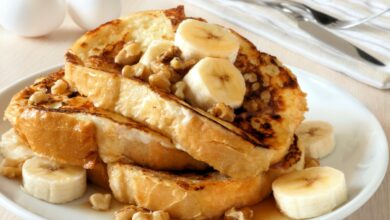
Its summer again and we want to take advantage of the warm weather by spending time with friends and family, not slaving away in the kitchen. Lucky for us (and you!) we’ve found fifteen easy side dishes that pair perfectly with burgers. Whether you’re planning a low-key weeknight dinner or a backyard party with friends, these quick and easy recipes will impress everyone, with minimal effort! Read on to get the scoop!
Easy Broccoli Salad with Bacon
Read More »Peach Caprese Salad
You’ll love this summery variation of a classic Caprese salad. The Salty Side Dish adds fresh, juicy peaches to the traditional mix of sliced tomatoes and mozzarella. Not only is this salad topped with a sweet and tangy balsamic glaze, but also a lemon and olive oil vinaigrette for a fresh pop of bright flavor.
Mexican Street Corn (Elote)
Fresh corn on the cob gets a cheesy makeover with this traditional Mexican recipe adapted by Princess Pinky Girl. In this version, grilled corn is topped with homemade lime and chili Mexican crema. Coated with more chipotle chili powder, crumbled cotija cheese, lime and parsley, the resulting side dish is so good, you’ll be licking your fingers and reaching for another cob in no time.
Garlic Roasted Potato Wedges
What’s more classic than burgers and fries? These homemade wedges from Cooking for My Soul have all the crispy edges of restaurant fries with a garlic and herb coating that takes this dish to a whole new level. With only 15 minutes of prep, this recipe will be a lifesaver for busy weekdays and a crowd-pleaser at family barbeques.
Grilled Watermelon Pineapple Skewers
Grilling fresh fruit helps sear the sugary juices into a crisp caramel. In this recipe from Amanda’s Cookin’, watermelon and pineapple are drenched in sticky honey and lime glaze before being tossed on the grill. Served up with a creamy yogurt dipping sauce, this recipe works as a side with or as a fresh, healthy dessert.
BLT Pasta Salad
This creamy, fresh and crunchy pasta salad from the Slow Roasted Italian is a fun twist on the summer favorite. The ridges in spiral rotini pasta capture every bit of the bright, creamy dressing, made with mayonnaise, sour cream and tangy apple cider vinegar. Loaded with crispy bacon, chopped lettuce and sweet tomato, each flavor of our favorite sandwich bursts through every bite.
Grilled Cowboy Caviar
Veggie loaded grilled cowboy caviar from the Gunny Sack is not only healthy but delicious. Made with charred corn, tomatoes, bell pepper and red onion, this recipe also includes creamy avocado and protein-packed beans. Tossed together with zesty Italian dressing, this summer side dish can be served on its own or scooped up with crispy tortilla chips.
Warm German Potato Salad
The Cozy Apron had us at “warm bacon vinaigrette”. This recipe has everything we look for in a comfort food recipe: bacon, caramelized onions and creamy roasted potatoes. The bacon dressing, accented with tangy apple cider vinegar and Italian seasoning, is best served warm but can also be refrigerated and served up as tasty leftovers the next day.
Roasted Parmesan Green Beans
Cheesy, crispy green beans from Made to Be a Momma are a great pairing for any home-cooked meal. This super simple recipe pairs grated parmesan cheese with crispy panko breadcrumbs to coat fresh green beans. Roasted to a crispy golden brown, these easy, cheesy beans are so good, even kids will love them!
Creamy Classic Coleslaw
A creamy, crunch coleslaw is always a welcome side dish for grilled burgers. This classic recipe from the Kitchn gives you three options for rich, light and tangy dressings. Regardless of which recipe you choose, this bright coleslaw packed with crunchy cabbage and carrots will bring the perfect blend of textures and flavors to your next barbeque.
Grilled Peach Salad with Blueberries
Featuring juicy fruits and creamy goat cheese, this salad from Erhardts Eat captures all the bright flavors of summer. In this 10 minute recipe, caramelized grilled peaches, fresh blueberries and a tangy blueberry vinaigrette top crisp spinach and arugula. Sprinkled with fresh crumbled goat cheese and sliced almonds, this is the perfect summer side salad.
Cheesy Corn Fritters
Looking for a new way to serve up fresh summer corn? Your family won’t be able to resist these cheesy corn fritters from Eat Well 101, even picky eaters! Crispy and golden on the outside, these corn cakes have a creamy, cheesy center. For a smoky flavor, paprika is added to the mix, balanced with bright lime juice and tangy sour cream.
Grilled Sweet Potatoes with Cilantro Vinaigrette
The rich flavor of sweet potatoes is offset with bright savory vinaigrette in this simple but impressive recipe from Cookin’ Canuck. Grilled until creamy on the inside and marked with crisp grill marks on the outside, sweet potato slices are then topped with a dressing of lime juice, garlic, agave nectar and chopped cilantro. The bright colors and flavors of this easy dish elevate sweet potato to a fancy side dish for family burger nights and backyard parties.
Mango Cucumber Summer Slaw
A colorful fruity version of our favorite summer slaw, this recipe from the Reluctant Entertainer is a sweet and spicy blend of healthy fruits and vegetables. Loaded with cabbage, bell peppers, mango and cucumber, this easy slaw takes only 15 minutes to put together. This includes the homemade dressing with savory fish sauce, bright lime and tangy vinegar.





